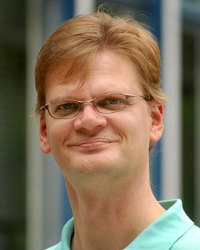Lecture: «Chemical Biology and Medicinal Chemistry of Glycosphingolipid Metabolism»

Aberrations in glucosylceramide metabolism are at the basis of several human disorders, including the lysosomal storage disorder, Gaucher disease, and type 2 diabetes. Factors involved in glucosylceramide metabolism are therefore valid targets for drug development. In this seminar, Dr. Hermen Overkleeft will report on the progress we made in the development of inhibitors and activity-based probes of the enzymes involved in glucosylceramide metabolism. His work analogues of the natural product, deoxynojiorimycin as enzyme inhibitors focuses on the evaluation of differently configured and substituted pyrrolidines and piperidines, with the aim to develop selective inhibitors of each of the enzymes involved, namely glucosylceramide synthase (GCS), acid glucosylceramidase (GBA1) and neutral glucosylceramidase (GBA2). In their studies on activity-based glycosidase probes the members of that research group took the natural product, cyclophellitol, as a basis. Introduction of a fluorophore at C6 (glucose numbering) in cyclophellitol yielded an activity-based probe highly specific for GBA1, whereas substitution of the epoxide for a functionalized aziridine yielded an in-class, broad-spectrum acrivity-based retaining beta-glucosidase probe. Moreover, configurational analogues of cyclophellitol/cyclophellitol aziridine yielded activity-based probes able to detect human retaining alpha-galactosidases (involved in Fabry disease) and retaining alpha-glucosidases (involved in Pompe disease).
About the speaker
Herman Overkleeft obtained his PhD degree in 1997 under the guidance of Professor Upendra Pandit (University of Amsterdam) on the subject of iminosugars as glycosidase inhibitors. He then did post-doctoral research with Professor Jacques van Boom (Leiden University, the Netherlands, 1997-1999) on ring-closing metathesis in the synthesis of polyhydroxylated oxacycles and azacycles, and with Professor Hidde Ploegh (Harvard Medical School, Boston, CA, USA, 1999-2001) on inhibition of proteases involved in human adaptive immunity. He returned to the Netherlands in 2001 to assume his current chair of bioorganic chemistry at Leiden University.
His current research focuses on enzyme inhibitors and activity-based probes in chemical biology and medicinal chemistry, in particular in glycobiology and immunology. Comparative activity-based protein profiling experiments are used to study cysteine proteases, proteasomes and retaining glycosidases. Competitive activity-based protein profiling has yielded selective inhibitors for five of the six catalytic activities of human constitutive proteasomes and immunoproteasomes. Activity-based probes are equipped with any of a number of fluorophores, cell surface receptor targeting moieties or with bioorthogonal tags for instalment of these by bioorthogonal chemistry.
Dr. Overkleeft has a long-standing collaboration with Prof. Hans Aerts (formerly University of Amsterdam, now Leiden University) on glycolipid metabolism and lysosomal storage disorders. Competitive inhibitors selective for glucosylceramidase, acid glucosylceramidase and neutral glucosylceramidase has been developed, and current focus is on the development of a dual glucosylceramide synthase/neutral glucosylceramidase inhibitor as a potential lead for clinical development towards Gaucher disease and neuropathological disorders



